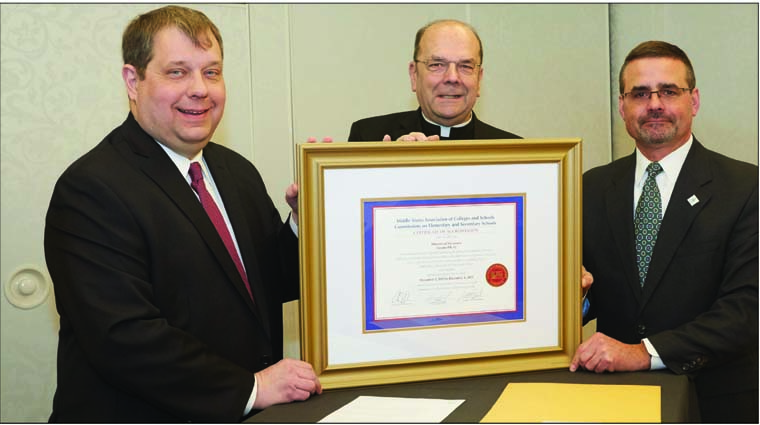Dr. Craig Tice, a commissioner and chair for the Middle States Association Commissions on Elementary and Secondary Schools, presented representatives from diocesan schools and the system of schools with certificates of accreditation Feb. 11.
Accreditation is defined by Middle States as “an external, objective validation of school quality and student achievement that fosters continuous school improvement.” Each of the 22 diocesan schools and the system of Catholic Schools in the Diocese of Syracuse earned accreditation in November, the culmination of a three-year process.
Speaking to members of the system implementation team, Bishop Robert J. Cunningham, Superintendent William Crist, and Dr. Tice offered words of congratulations and commendation.
“It’s just very impressive to see a system-wide accreditation; it doesn’t happen that often,” Dr. Tice said, because the accreditation process at the elementary and secondary levels is voluntary. “But I think what it shows is that systems like yourself and districts that go through this, as well as individual schools, have that commitment to continuous improvement. You’re joining a select group and I think you all should be very proud of your accomplishments, because of the fact that you have chosen to undertake and benchmark your system against research-based and rigorous standards, because you have committed to that life of continuous improvement and making each day better than the next.”
Accreditation is a great accomplishment, noted Director of Leadership Development & Mission Effectiveness Barbara Messina, who served as internal coordinator, but it’s just the first step.
“Accreditation means we have a viable plan, that we’re in good shape, to start looking at all the right things, and we have a solid plan to move forward,” she said. Each school and the entire system will spend the next seven years working to meet the goals set during the process, she explained. “What our self-study did and what our accreditation prepared us for was to look for ways to continuously improve what we’re doing. So even though we’re doing well, we have a new focus and we’re looking for ways to do things better than we ever did them before,” Messina said.





